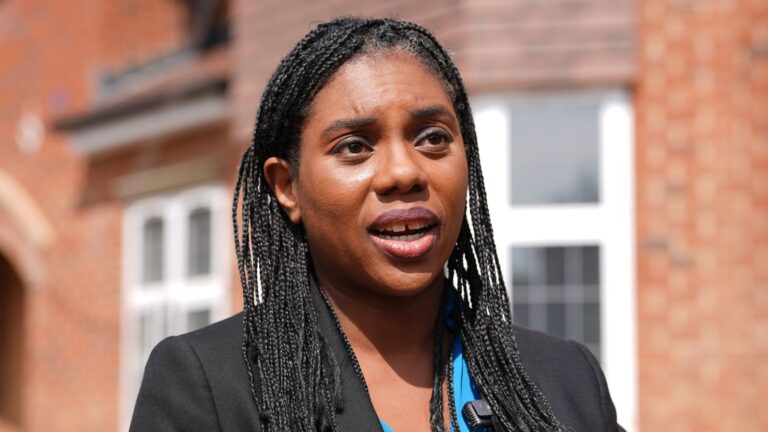Nesrine Malik, The Guardian.
If Kemi Badenoch wonders why her party conference looks and feels like a sideshow, perhaps she should reflect on the Conservatives’ 14 years in power.
Ibelieve it is good practice as a columnist to keep track of when you have been wrong, and the thing I have got most emphatically wrong over the past few years is the Conservative party’s prospects. I was convinced that the party that still won elections despite the chaos and instability of Brexit, not to mention the calamities of austerity, could get away with anything. I even believed that if it lost power, as it did last year, the risk of a Tory restoration was still very high.
What I did not foresee was the most successful political party in the democratic world, by some measures, coming so close to extinction this quickly. As the Tory party conference gets under way in Manchester, with rumours abounding over the weekend about diminished attendance, the polling increasingly suggests that Britain’s next general election will be a contest between Labour and Reform. That is quite the turnaround for Britain’s “natural party of government”.
But (you knew there was going to be a but) it might also be the case that the fundamental judgment I made – that there was always going to be a powerful, difficult-to-dislodge political force on the right – still stands. Because in many ways, the contemporary Conservative party has not died, it has only mutated to its next form.
So much of the fertile ground that Reform thrives in now was tilled by the Tories. The pugnaciousness and jingoism that arose in the wake of Brexit normalised politics-by-separatism and a kind of permanent contempt for the people who didn’t vote for you. Long before the then prime minister, Rishi Sunak, threatened to leave the European convention on human rights – a Reform pledge and, now, in a rush to keep up, a Kemi Badenoch one – it was the Conservatives who helped make immigration a permanently vexatious issue that needed to be tackled in ever more cruel and performative ways. Think of David Cameron’s “tens of thousands” pledge or Theresa May’s infamous “go home” vans.
It was under the Tories that rhetoric about the supposed failure of multiculturalism became something a government minister would say. And it was the Conservatives who went out of their way to play down the presence of institutional racism, who launched culture war after culture war about nonsense such as the content of the BBC Proms, and embraced the politics of government by controversy and spectacle. The result is Nigel Farage and Reform, whose unseriousness and divisiveness is now not a novelty, but business as usual.
There was a longer structural process at work here, of course. The transformation of the Tories was the result of an economic climate that worked against the party. The very thing that creates natural Tory voters, that increasing sense of having a stake in the status quo via home ownership, social mobility, increasing savings and assets, is gone. Younger voters are not making the same conversion as they age that their predecessors did. Wage growth has stagnated and the biggest source of rising net worth now is through house-price appreciation. For new generations locked out of a future of anything to preserve, the main instinctive draw of the Tory brand diminished.
That economic snookering is part of the reason the Tories opted for culture war. The energy that couldn’t be spent defending the dead end of British capitalism had to be directed on such diversions as leaving the EU, the Rwanda deportation scheme and various panics about non-issues such as lefty “agitators taking a bulldozer to our history”. This inevitably had an escalatingly corrosive quality, revealing how the party had become whittled down to something far smaller than a vehicle for a coherent, fiscally responsible ideology of governance.
It also yielded dividends for Nigel Farage, who benefited from a politics-and-media ecosystem fed on the red meat of crisis and crackdown. He also benefits from the diminishment in expectations and quality of leadership. The people in the Conservative party with the appetite and character to pursue its new brand of reckless bluster inevitably came across as a cohort of shallow knaves and charlatans. Let’s not forget all the ineffectual and insubstantial attention-seekers who acquired state power: Boris Johnson, Liz Truss, Kwasi Kwarteng, Rishi Sunak, Suella Braverman and, of course, Kemi Badenoch. Put them all together and the result isn’t even half of a decent politician. Badenoch in particular is less a party leader and more a sort of provocative statement generator. She hates critical race theory. Wokeness is a “civilisation-ending philosophy”. Her big policy renewal programme was a rant about net zero. The latest is a pledge to create an immigrant removals force modelled on US Immigration and Customs Enforcement (ICE). She embodies the legacy of a flight from seriousness, taking refuge in attack and rupture.
This is all why the Conservative party conference looks and feels like a sideshow. Farage has none of the Tory party’s legacy and reputation to uphold, and all of the benefits of the lowered standards that the Tories have established. Reform is the Conservative party, but without the burden of history or that tempering, quasi-aristocratic sensibility of seeing yourself as the rightful steward of the country into posterity. We may cling to hope that, like the Tories, Reform will also collapse under the weight of all that it cannot deliver. But for now, Farage’s continuity conservatism looks impossibly hard to vanquish. I sincerely hope, for the country’s sake, that one day I will be writing to you to say that I got that wrong too.
In the meantime, and this may be little consolation to the party as it starts its conference at a historical low, what I would say to Kemi Badenoch is simple: do not see Reform’s stunning rise as a failure. Look upon your works and rejoice.


